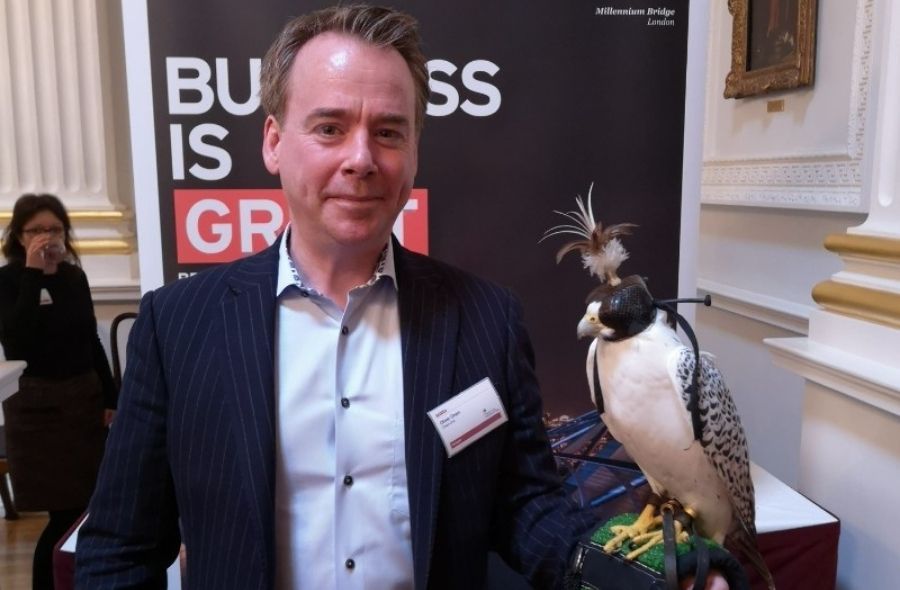May, 2024
San Francisco, USA

Oliver Oram is the Founder and CEO of Chainvine, a next-generation platform that offers flexible solutions for entity, identity, and digital asset management using Blockchain Technology. He has valuable experience working in the financial technology sector in international markets which led to his interest in developing current and future Decentralized Technology, IoT, Supply Chain, and Telematics. As a CEO, Oliver leads an innovative team of experts and continuously focuses on increasing productivity and transparency in the supply chain. He has also partnered with Central Bank Governors of The Common Wealth for Technology Management and is a member of The Expert Advisory Committee at OECD, contributing to the development of OECD thematic projects and enhancing rural innovation. Being a frequent spokesman, he talks about blockchain technology and cryptocurrencies in various events.
My name is Oliver Oram and I am a British/Swedish citizen during my work life, I have often traveled and enjoyed good wine in social and business settings. I have always had a fondness for vineyards and their settings and the hard work it takes battling mother nature to quench the first of many. So, I guess I always like wine, or at least as long as that was legal like it from 18, I was on a flight from Sweden to the UK and was reading about a wine fraudster named Rudy Kurniawan and it seemed to be the biggest problem the industry faced was in the sharing of data and traceability of data around its assets and this is where I saw both old Financial technology and new technology such as Blockchain playing a part firstly in addressing fraud and from this we have found a number of features and benefits that a good address platform solution can offer the drinks market
Chainvine is establishing a new supply chain platform that will fundamentally reduce friction in international trade. It will improve traceability, data capture, and compliance around wines and spirits, allowing for wine owners, vineyards, exporters, and importers to get the most return on their goods.
We are creating strong data integrity in the supply chain that will impact how businesses transfers’ wine. It will result in automatic compliance to relevant government authorities involved in the export and import of goods.
[[relatedPurchasesItems-35]]
The new supply chain platform will operate at a fraction of the traditional cost and risk. It offers highly adaptable solutions for the entity, identity, and digital asset supply chain management, using regulated cloud-native software, interlinked with the world of blockchains and smart contracts.
The modular solutions can be integrated via APIs with client systems. Chainvine Encryption Services ensures that client data is stored securely with access only authorized by entities managed by CEM and CIM.

Source: Twitter / Oliver Oram
This is the technical description from Investopedia
Distributed ledger is often referred to as Blockchain A distributed ledger is a consensus of replicated, shared, and synchronized digital data geographically spread across multiple sites, countries, or institutions.
I would actually say it's what it is: a shared ledger made accessible by secure cryptography and a perfect traceability tool. In My opinion, the technology is powering platforms like Chainvine in order to help share and control data across supply chains for key stakeholders who value and their own products and services and understand the power of sharing data for the end consumer
Compliance and standards are important to the wine industry but for small and medium producers with limited resources can often become a barrier to trade when the process of compliance and showing standards becomes economically unsustainable. I believe with a mixture of IoT/QR codes and DLT we can offer SMEs and larger players in the wine industry better solutions to help with compliance and at the same time improve the company’s marketing image for example this could be reporting energy efficiency and SDGs.
I believe Blockchain technology is handled well and is far more secure than most technologies and all technologies available to the current supply chain. Storage in the cloud could be compared to a filing cabinet in the old days it's not the cabinet or the cloud it’s the process and interaction that happen around and outside of them that can cause problems
I believe that it is not so many flaws but a lack of understanding about what technologies exist to help the industry operate better and more efficiently today and it is also a flaw of some of my peers and technologists that they overcomplicate technology and put off the very people they are trying to help. Chainvine tackles these flaws by showing our clients and partners the features and benefits of using a solution-driven platform like ours with a concentration on economic savings/sustainability through lowering the time in supplying compliance documentation and data etc and also showing the environmental sustainability of what we do.

Chainvine Logo. Source: Chainvine
The original Minimal Viable Product that we developed in 2016 was to help consumers through identities on the bottle be certain to a higher degree that the wine they were drinking was indeed the wine they had just bought. It is from helping with the simple identity of the wine that many benefits can be made available and not the least directly communicating the wine's story with the consumer.
Simple better auditing and traceability in the supply chain.
We have been using intelligent contracts as a way of managing data and access to data in the supply chain, think of this like someone requesting a wet signature in order to access paperwork or data we do this in a fraction of the time with these contracts and with far superior traceability and transparency for those with the permission to see this data
Education and trying to silence all of the noise that comes with using new and emerging technologies, this became easier as time went by as we concentrated on features and benefits.
Header Image Source: Chrunchbase
Interviewed by Prithvi Nagpal, Editor & Sommelier, Beverage Trade Network